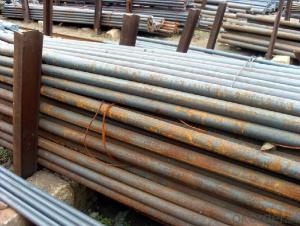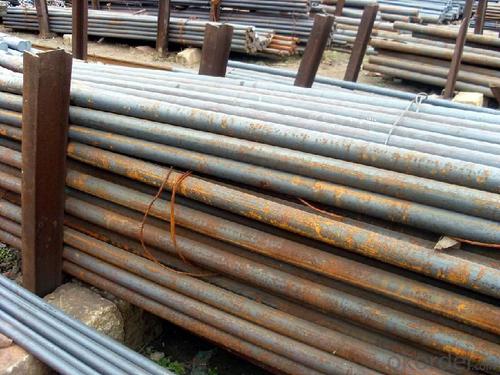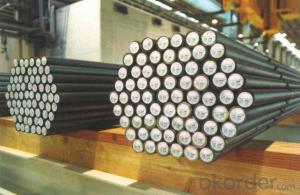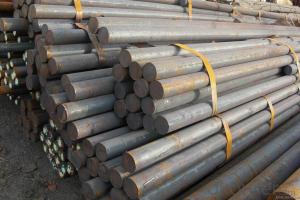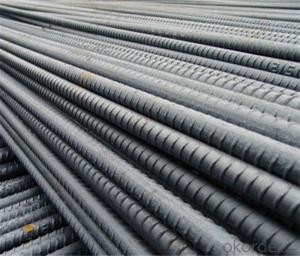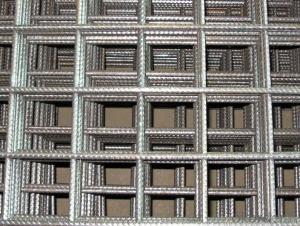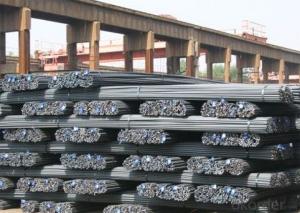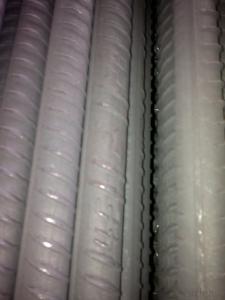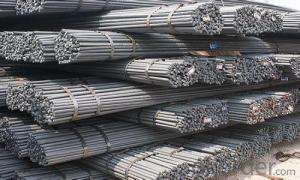Reinforced Building Steel Bars Deformed Steel
- Loading Port:
- China main port
- Payment Terms:
- TT OR LC
- Min Order Qty:
- 30 m.t.
- Supply Capability:
- 10000 m.t./month
OKorder Service Pledge
OKorder Financial Service
You Might Also Like
Specification
Reinforced Building Steel Bars Deformed Steel
Product Information:
1.Type:Metal Building Material
2.Material:Steel
3.Use:Building
4.Feature:Reinforced
Chemical Composition(%)
| C | Si | Mn | P | S | B | Cr | Cu | V | Mo | CEQ |
| 0.19 | 0.13 | 0.41 | 0.037 | 0.018 | 0.0015 | 0 | 0 | 0 | 0 | 0.26 |
Product Overviews:
| Product Name | Typical Grades | Diameter(mm) | Standard adopted |
| Carbon Steel | 20 (1020/S20C/C22) | Ø16-Ø300 | GB/SAE/JIS/DIN |
| 40 (1040/S40C/C40) | |||
| 45 (1045/S45C/C45) | |||
| Bearing Steel | GCr9 (51100/SUJ1) | Ø12-Ø250 | |
| GCr15 (52100/SUJ2/100Gr6) | |||
| GCr9SiMn (A485-Gr.1/SUJ3) | |||
| Cr-Mo Steel | 20Cr (5120/SCr420H/20Cr4) | Ø12-Ø250 | |
| 40Cr (5140/SCr440/41Cr4) | |||
| 42CrMo(4140/SCM440/42CrMo4) | |||
| Gear Steel | 20CrNiMo | Ø16-Ø600 | |
| 20CrMn(5115/SMnC420/20MnCr5) | |||
| 20CrNiMo(8620/SNCM220/20CrMiMo2) |
Product Show:

Our Advantages:
· Industry experience over 20 years.
· Shipment of goods -More than 70 countries worldwide.
· The most convenient transport and prompt delivery.
· Competitive price with best service.
· High technical production line with top quality products.
· High reputation based on best quality products.
With our experienced, enthusiastic and dynamic staffs, we assure to bring you the products with best quality, reasonable prices and good after-sales services under the motto: Friends First, Business After.
Communication, Experience, Expertise and Best efforts are our Promises to you.
- Q: How does special steel contribute to reducing material waste?
- Special steel contributes to reducing material waste through its superior properties and durability. Unlike traditional steel, special steel is designed to have enhanced strength, corrosion resistance, and wear resistance. These properties allow for the production of thinner and lighter components without compromising their functionality, leading to reduced material consumption. Additionally, the longevity and resistance to wear of special steel products result in longer service life, minimizing the need for frequent replacements and further reducing material waste.
- Q: What are the properties of carbon steel?
- Carbon steel is a type of steel that primarily consists of iron and carbon. It is known for its high strength, durability, and relatively low cost compared to other materials. Carbon steel is also highly resistant to corrosion and can withstand high temperatures. It can be easily shaped and welded, making it a versatile material for various applications in industries such as construction, automotive, and manufacturing.
- Q: What are the different alloying elements used in special steel?
- There are several different alloying elements used in special steel, including chromium, nickel, molybdenum, vanadium, tungsten, cobalt, and manganese. These elements are added in varying amounts to enhance the steel's properties such as strength, corrosion resistance, hardness, and heat resistance.
- Q: How does special steel contribute to the pharmaceutical aftermarket industry?
- Special steel plays a significant role in the pharmaceutical aftermarket industry by providing high-quality materials for manufacturing critical components such as machinery, equipment, and tools. The unique properties of special steel, such as corrosion resistance, strength, and durability, ensure the production of efficient and safe pharmaceutical products. Additionally, special steel's ability to withstand extreme temperatures and pressures enables the creation of advanced processing systems, leading to improved efficiency and productivity in pharmaceutical manufacturing.
- Q: How does special steel perform in additive manufacturing applications?
- Special steel performs well in additive manufacturing applications due to its high strength, durability, and resistance to wear and corrosion. The unique properties of special steel, such as its ability to withstand high temperatures and extreme environments, make it an ideal material for 3D printing processes. Additionally, the flexibility and customization offered by additive manufacturing allows for the creation of complex geometries and intricate designs, further enhancing the performance of special steel in various applications.
- Q: How is special steel used in the medical supply chain?
- Special steel is used in the medical supply chain for a variety of applications. It is utilized in the manufacturing of surgical instruments, implantable devices, and medical equipment due to its high strength, corrosion resistance, and biocompatibility. Special steel ensures the durability and reliability of these critical medical supplies, contributing to the safety and effectiveness of healthcare procedures and treatments.
- Q: What are the environmental benefits of using special steel?
- Special steel, also known as alloy steel, offers several environmental benefits. Firstly, it has a longer lifespan compared to conventional steel, reducing the need for frequent replacements and minimizing the associated resource consumption and waste generation. Secondly, special steel is often manufactured using recycled materials, thereby reducing the demand for new raw materials and the energy required for extraction and processing. Additionally, its high strength and durability enable the production of lighter structures and components, leading to lower transportation and fuel consumption. Lastly, special steel can be recycled at the end of its life, further reducing waste and the environmental impact associated with its disposal.
- Q: How does special steel contribute to improving product durability?
- Special steel contributes to improving product durability in several ways. Firstly, special steel is known for its high strength and toughness, which makes it more resistant to wear and tear. This means that products made with special steel are less likely to develop cracks, deformations, or other forms of damage during regular use. Additionally, special steel often has enhanced corrosion resistance properties, making it more resistant to rust and other forms of degradation. This helps to prolong the lifespan of products, particularly those exposed to harsh environments or extreme weather conditions. Moreover, special steel can also offer increased heat resistance, enabling products to withstand high temperatures without losing their structural integrity. Overall, the use of special steel in manufacturing processes significantly enhances the durability and longevity of products.
- Q: What are the requirements for special steel used in metalworking tools?
- The requirements for special steel used in metalworking tools include high hardness, excellent wear resistance, good toughness, and high heat resistance. Additionally, the steel should have good machinability, be able to hold a sharp edge, and have the ability to withstand high temperatures and loads without deforming or breaking.
- Q: How does special steel contribute to the defense aftermarket industry?
- The defense aftermarket industry heavily relies on special steel to manufacture essential materials for defense equipment and components. Special steel possesses exceptional properties, including strength, durability, and resistance to corrosion and extreme temperatures, making it the preferred choice for producing military vehicles, aircraft, weapons, and defense systems. One significant contribution of special steel to the defense aftermarket industry is its use in armor and ballistic protection. By utilizing special steel alloys, armor plates and panels can be created to withstand high-velocity impacts, providing crucial protection for military personnel and vehicles against enemy fire. These materials offer enhanced protection, reducing the risk of casualties and damage during combat. Furthermore, special steel is essential in the production of aerospace components. Military aircraft are vital for various defense operations, such as reconnaissance, surveillance, and combat. Special steel alloys ensure the safety, reliability, and performance of these aircraft by manufacturing critical components like landing gear, engine parts, and structural elements. Special steel's resistance to corrosion and extreme conditions also makes it suitable for constructing naval vessels and submarines. These assets operate in harsh marine environments, facing saltwater, extreme temperatures, and constant mechanical stress. Special steel alloys with high-strength properties and corrosion resistance are utilized in building ship hulls, propeller shafts, and critical components, ensuring longevity and operational effectiveness. Moreover, special steel contributes to the defense aftermarket industry through its role in the supply chain. The production and maintenance of defense equipment and components often require specialized machinery and tools, which are made from special steel. The availability of these materials is crucial for maintaining a robust defense industry and enabling efficient production and maintenance of defense systems. In conclusion, special steel plays a vital role in the defense aftermarket industry by providing the necessary materials for producing high-performance, reliable, and durable defense equipment. Its unique properties contribute to the safety, effectiveness, and longevity of military vehicles, aircraft, weapons, and naval vessels, ultimately enhancing the capabilities of defense forces worldwide.
Send your message to us
Reinforced Building Steel Bars Deformed Steel
- Loading Port:
- China main port
- Payment Terms:
- TT OR LC
- Min Order Qty:
- 30 m.t.
- Supply Capability:
- 10000 m.t./month
OKorder Service Pledge
OKorder Financial Service
Similar products
Hot products
Hot Searches
Related keywords
